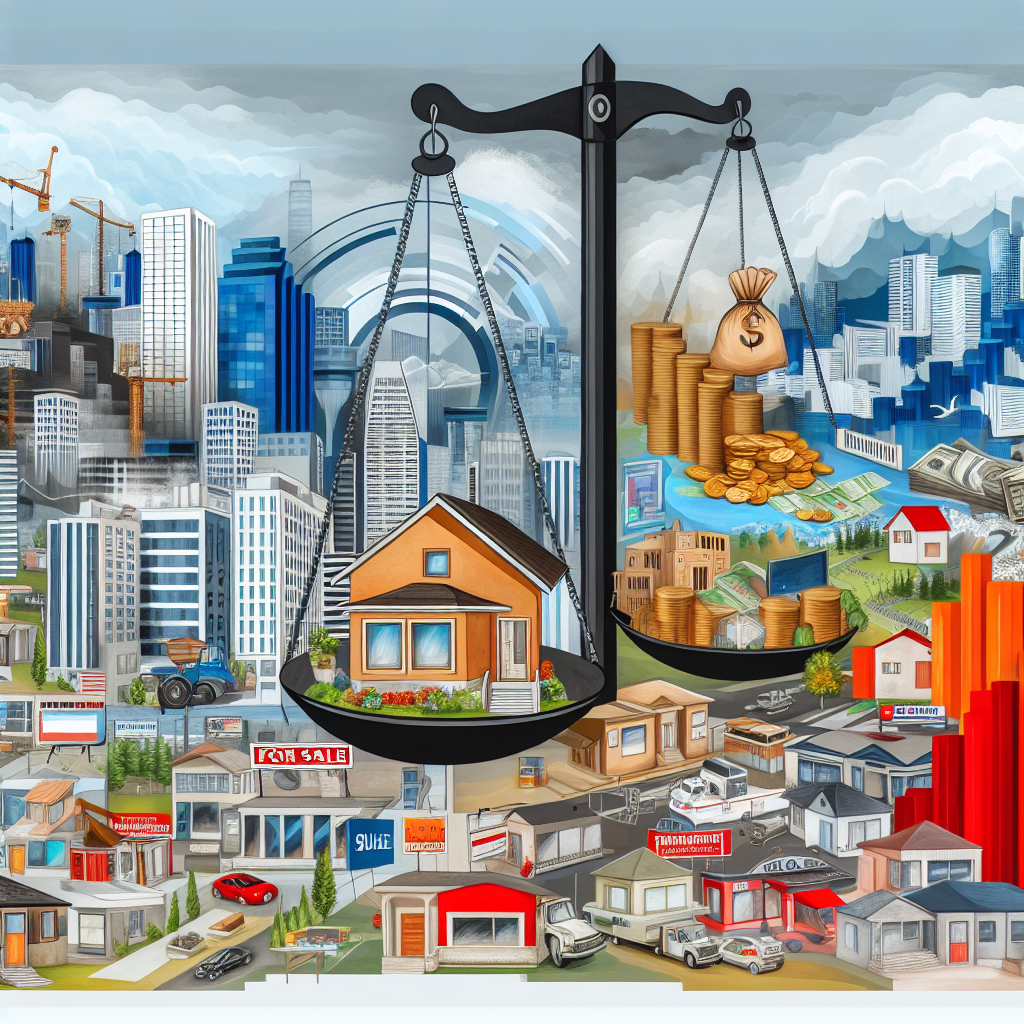
Real estate and the economy are closely intertwined, with each having a significant impact on the other. The real estate market is not only a reflection of the overall economic health of a country but also a driving force behind economic growth. In this article, we will explore the relationship between real estate and economic factors, examining how they influence each other and the implications for investors, homeowners, and policymakers.
The Role of Real Estate in the Economy
Real estate plays a crucial role in the economy, contributing to both GDP and employment. The construction sector, which includes residential and commercial real estate development, is a major driver of economic growth. When the real estate market is booming, it creates jobs, stimulates consumer spending, and generates tax revenue for the government.
Furthermore, real estate is a significant component of household wealth. For many individuals, their home is their most valuable asset. The value of real estate holdings affects consumer confidence and spending patterns. When property values rise, homeowners feel wealthier and are more likely to spend money on discretionary items, such as home renovations or vacations.
The Impact of Economic Factors on Real Estate
Economic factors, such as interest rates, inflation, and employment levels, have a direct impact on the real estate market. Let’s explore how these factors influence the various segments of the real estate sector:
Residential Real Estate
Interest rates play a crucial role in the residential real estate market. When interest rates are low, borrowing costs decrease, making it more affordable for individuals to purchase homes. This leads to increased demand for housing, driving up prices. Conversely, when interest rates rise, borrowing becomes more expensive, reducing affordability and dampening demand.
Inflation also affects residential real estate. Inflation erodes the purchasing power of money over time, causing the prices of goods and services to rise. However, real estate is often seen as a hedge against inflation. As the cost of living increases, so does the value of real estate. Homeowners can benefit from this appreciation by building equity in their properties.
Commercial Real Estate
Commercial real estate is closely tied to the overall health of the economy. When businesses are thriving, they require more office space, retail stores, and industrial facilities. Conversely, during an economic downturn, businesses may downsize or close, leading to a decrease in demand for commercial real estate.
Employment levels also impact the commercial real estate market. When job growth is strong, companies expand and require additional office space to accommodate their workforce. Conversely, high unemployment rates can lead to a surplus of office space as companies downsize or go out of business.
Case Study: The 2008 Financial Crisis
The relationship between real estate and the economy was starkly illustrated during the 2008 financial crisis. The collapse of the housing market, fueled by subprime mortgage lending and a subsequent wave of foreclosures, triggered a severe economic recession.
As property values plummeted, homeowners found themselves underwater, owing more on their mortgages than their homes were worth. This led to a wave of foreclosures and a glut of distressed properties on the market. The oversupply of homes, coupled with a decrease in demand, caused housing prices to plummet further.
The ripple effects of the housing market crash were felt throughout the economy. Banks and financial institutions that held mortgage-backed securities suffered significant losses, leading to a credit crunch and a contraction in lending. Consumer spending declined as homeowners faced foreclosure or struggled to make mortgage payments.
Furthermore, the construction industry, which had been a major driver of economic growth, came to a standstill. Many construction companies went out of business, leading to widespread job losses and a decrease in consumer confidence.
Policy Implications
Given the strong relationship between real estate and the economy, policymakers have a vested interest in ensuring the stability of the real estate market. They can influence the market through various policy tools, including:
- Monetary Policy: Central banks can adjust interest rates to stimulate or cool down the real estate market. Lowering interest rates encourages borrowing and stimulates demand, while raising rates can help curb excessive speculation and prevent asset bubbles.
- Fiscal Policy: Governments can implement tax incentives or subsidies to promote homeownership or stimulate real estate investment. For example, tax deductions for mortgage interest payments can make homeownership more affordable.
- Regulation: Governments can implement regulations to prevent predatory lending practices and ensure the stability of the financial system. Stricter lending standards can help prevent excessive risk-taking and reduce the likelihood of a housing bubble.
Conclusion
The relationship between real estate and economic factors is complex and multifaceted. Real estate not only reflects the overall health of the economy but also plays a crucial role in driving economic growth. Economic factors, such as interest rates, inflation, and employment levels, directly impact the real estate market, influencing both residential and commercial segments.
Understanding the relationship between real estate and the economy is essential for investors, homeowners, and policymakers. By monitoring economic indicators and market trends, stakeholders can make informed decisions and mitigate risks. Additionally, policymakers can use various policy tools to ensure the stability of the real estate market and support economic growth.
In conclusion, real estate and the economy are deeply interconnected, and changes in one can have significant implications for the other. By recognizing and understanding this relationship, individuals and policymakers can navigate the real estate market more effectively and contribute to sustainable economic growth.








